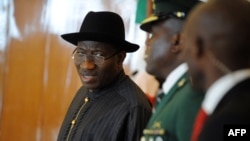ABUJA —
West African leaders have said upcoming elections in Mali and Guinea-Bissau will go ahead as scheduled, despite reports the two countries' electoral commissions are not ready. At a summit in Abuja, the leaders also called for new security policies that will allow the region to respond more quickly to emergencies like last year's crisis in Mali.
Heads of state from the Economic Community of West African States [ECOWAS] met this week in the Nigerian capital ahead of elections in Mali and Guinea-Bissau.
Ivory Coast President Alassane Ouattara said Mali elections will go ahead on the scheduled July 28 date, despite reports that the election commission is not prepared to hold elections in a country where hundreds of thousands of people remain displaced by war.
Ouattara said elections will “turn the page on the Mali crisis.”
In January, a French-led coalition invaded northern Mali, re-taking territories from Islamist militant groups.
Nigerian President Goodluck Jonathan said Wednesday that ECOWAS will need the support of countries outside Africa to help Mali have elections that are free, fair and non-violent.
“We should use this opportunity to appeal to the international community to intensify their assistance to bridge the financial gap of $25 million for the provision of critical logistical support, in particular air access, [and] deployment of as many international and national observers for the 28th of July elections in Mali.”
Leaders also called for a review of security policies in West Africa. Reading a statement, ECOWAS President Kadre Desire Ouedraogo said the organization should learn from the crisis in Mali and develop a plan for a “rapid military response” in the future.
The statement also calls on the African Union and the European Union to lift sanctions against Guinea-Bissau and recognize the country's transitional government ahead of elections scheduled for November 24 this year.
After a 2012 military coup, the U.N. Security Council imposed sanctions on Guinea-Bissau, saying it had “grave concerns” that the coup, among other things, was increasing the amount of drugs trafficked through Guinea-Bissau, a country well-known for being a transit point for cocaine going from Latin America to Europe.
Military leaders in Guinea-Bissau also have been accused of drug trafficking.
In addition, the statement appeals to political parties in Togo and Guinea, which also are about to hold elections, to have a non-violent reaction to the results, regardless of the outcome.
Heads of state from the Economic Community of West African States [ECOWAS] met this week in the Nigerian capital ahead of elections in Mali and Guinea-Bissau.
Ivory Coast President Alassane Ouattara said Mali elections will go ahead on the scheduled July 28 date, despite reports that the election commission is not prepared to hold elections in a country where hundreds of thousands of people remain displaced by war.
Ouattara said elections will “turn the page on the Mali crisis.”
In January, a French-led coalition invaded northern Mali, re-taking territories from Islamist militant groups.
Nigerian President Goodluck Jonathan said Wednesday that ECOWAS will need the support of countries outside Africa to help Mali have elections that are free, fair and non-violent.
“We should use this opportunity to appeal to the international community to intensify their assistance to bridge the financial gap of $25 million for the provision of critical logistical support, in particular air access, [and] deployment of as many international and national observers for the 28th of July elections in Mali.”
Leaders also called for a review of security policies in West Africa. Reading a statement, ECOWAS President Kadre Desire Ouedraogo said the organization should learn from the crisis in Mali and develop a plan for a “rapid military response” in the future.
The statement also calls on the African Union and the European Union to lift sanctions against Guinea-Bissau and recognize the country's transitional government ahead of elections scheduled for November 24 this year.
After a 2012 military coup, the U.N. Security Council imposed sanctions on Guinea-Bissau, saying it had “grave concerns” that the coup, among other things, was increasing the amount of drugs trafficked through Guinea-Bissau, a country well-known for being a transit point for cocaine going from Latin America to Europe.
Military leaders in Guinea-Bissau also have been accused of drug trafficking.
In addition, the statement appeals to political parties in Togo and Guinea, which also are about to hold elections, to have a non-violent reaction to the results, regardless of the outcome.





